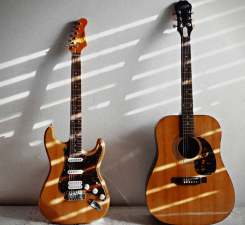Is Electric Guitar Easier Than Acoustic for Beginners?
Both electric and acoustic guitars are suitable for beginners, but it all comes down to personal preference and learning goals.
Both electric and acoustic guitars are suitable for beginners, but it all comes down to personal preference and learning goals.
The electric guitar is better for beginners because:
- Electric guitar strings are thinner than acoustic guitar strings, making it easier to understand and apply pressure to the strings. This allows beginners to press the strings more easily, reducing the risk of finger pain.
- Electric guitars typically have narrower necks, making it easier for fingers to manipulate and change chords when fretting the strings.
- Electric guitars can be plugged into headphones or connected to external devices like amplifiers, making practice more private. The tone and volume can be adjusted to personal preference, making it easier to spark interest and motivation.

The acoustic guitar is better for beginners because:
- The acoustic guitar's tone is more natural and warm, providing a better listening experience for beginners who want to delve deeper into guitar playing.
- The wider fretboard of an acoustic guitar helps beginners compose more accurately, which, once adjusted, also facilitates learning other guitar styles.
- Acoustic guitars are generally easier to carry and maintain, and they don't rely on external devices or a power source. In summary, both electric and acoustic guitars have their advantages, and the choice should be based on personal preference, learning goals, and musical style.
The following points should be considered during learning:

Find appropriate learning resources:
- Beginners can find beginner-friendly guitar tutorials and textbooks online or in bookstores. These resources typically provide systematic guidance, helping you learn from the fundamentals.
Maintaining correct posture and fingering:
- Proper posture and fingering are crucial for guitar playing. Beginners should pay attention to their posture and fingering, and gradually improve them during practice.
Persistent practice:
- Learning guitar requires time and patience. Beginners should practice daily and gradually improve their technique and speed.
Learning to use a metronome:
- A metronome can help beginners better control rhythm and tempo, making their playing more stable and accurate.
Understand basic music theory:
- Learning guitar requires an understanding of basic music theory, such as notes, scales, and chords. Understanding these fundamentals will help you better understand and play repertoire.
